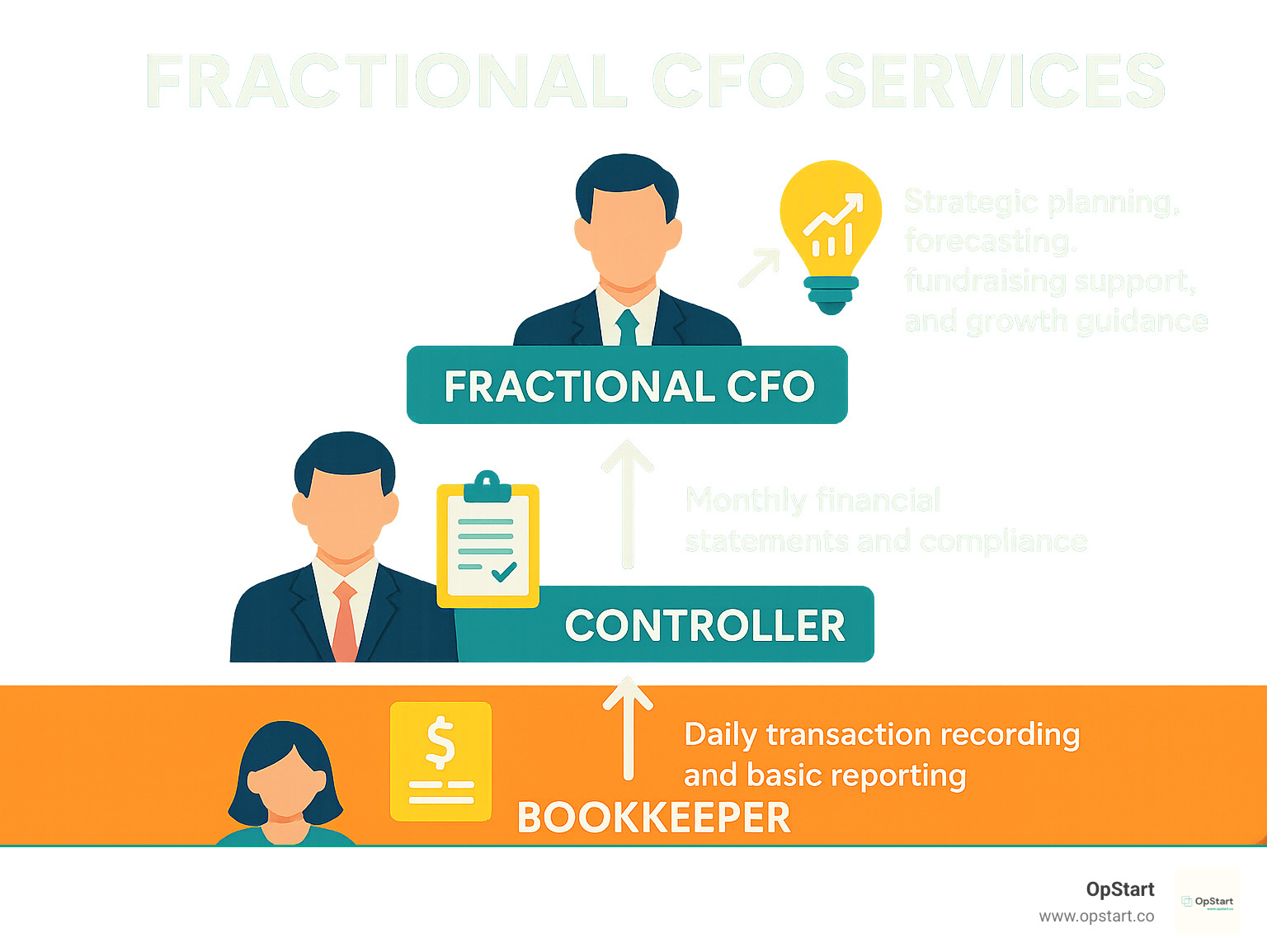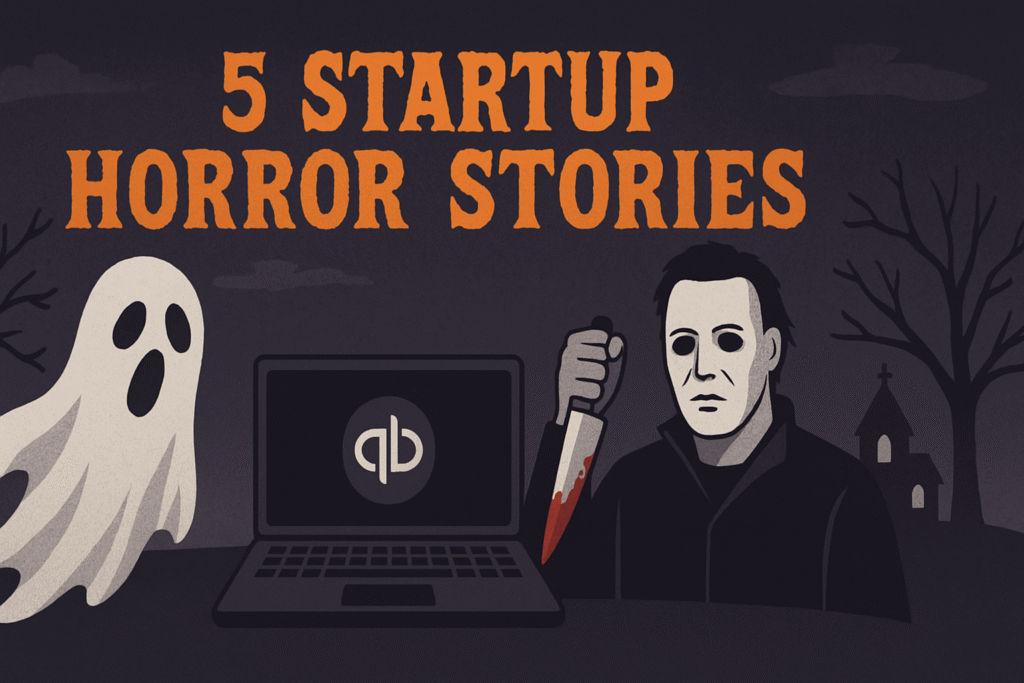Why Growing Startups Turn to Fractional CFO Services
Fractional cfo services provide startups with expert financial leadership without the full-time executive cost. This model offers significant benefits:
- Cost savings: Over 50% reduction compared to a full-time CFO ($250k-$450k annually).
- Strategic expertise: Access to experienced finance leaders from top firms.
- Flexible engagement: Scale services up or down based on your needs.
- Growth support: Financial modeling, fundraising prep, and investor relations.
Common services include cash flow forecasting, financial modeling, budgeting, investor reporting, and strategic KPI development. As one CEO shared: “The mental load OpStart has taken off our plates is immense. Plus, it’s up leveled our financial presentations for investors.”
With cash flow issues causing 82% of business failures, expert financial guidance is crucial. A fractional CFO provides this strategic leadership on a part-time basis, focusing on future growth rather than just past transactions. They help you make data-driven decisions to avoid common pitfalls and successfully scale your business.
I’m Maurina Venturelli, and I’ve helped high-growth companies like Sumo Logic and LiveAction steer complex financial challenges. Through my work with fractional cfo services at OpStart, I’ve seen how the right financial partner empowers founders to become confident, strategic leaders.

Understanding the Fractional CFO: A Strategic Partner for Growth

A fractional CFO is an experienced financial executive who works with your company on a flexible, part-time basis. They act as a strategic partner, providing C-level expertise and outsourced leadership without the C-level price tag. Unlike a temporary interim CFO, a fractional CFO is an ongoing partner dedicated to your long-term growth.
The primary difference from a full-time CFO is cost and flexibility. A full-time hire commands a salary of $250,000 to $450,000 annually plus benefits and equity. Fractional cfo services provide access to top-tier talent at a fraction of that cost.
For a deeper dive, see our guide on the difference between a fractional CFO and other financial roles.
The Strategic Advantage Over a Full-Time Hire
The model’s cost-effectiveness extends beyond salary, eliminating recruitment fees and benefits packages. This pay-for-what-you-need approach provides expertise on-demand from professionals with diverse industry experience and top-tier accounting backgrounds. The key advantage is scalability; you can adjust services as your business needs evolve, ensuring you have the right level of support during fundraising, M&A, or periods of rapid growth.
How a Fractional CFO Solves Critical Business Challenges
A fractional CFO addresses the core issues that hinder growth. They tackle cash flow management—the cause of 82% of business failures—with proactive forecasting. They identify profitability issues like low margins or high expenses and implement effective cost-cutting strategies.
As companies scale, they often face a growth chasm where old systems break. A fractional CFO helps bridge the growth chasm by implementing sustainable financial systems, drawing on principles from lean organizations. For fundraising readiness, they are invaluable, preparing investor-ready models, assisting with due diligence preparation, and managing investor relations. Learn more in our guide on fundraising. In short, they help you make smarter decisions with better data.
The Core Expertise: What Can a Fractional CFO Do for Your Business?

A fractional cfo services partner transforms your financial operations from a reactive chore into a proactive growth engine. They offer a comprehensive suite of support across four key areas:
Strategic Planning
A fractional CFO builds your financial roadmap with forward-looking strategies.
- Financial forecasting: Create a blueprint for sustainable growth and anticipate future cash positions.
- Budgeting: Craft realistic plans for effective resource allocation and spending control.
- Variance analysis: Compare performance against budgets to quickly identify and address deviations.
- Business modeling: Analyze the financial impact of new products, markets, or strategic shifts.
Financial Operations
They ensure your daily business runs smoothly and efficiently.
- Cash flow management: Optimize liquidity to steer lean times and fund growth initiatives.
- Financial reporting: Deliver accurate, timely financial statements (P&L, Balance Sheet, Cash Flow) with actionable insights.
- KPI Dashboards: Develop real-time dashboards to monitor financial health and operational efficiency.
- Internal controls: Establish robust processes to protect assets and ensure data integrity.
Learn more about managing your startup’s finances in our guide on startup accounting services.
Capital & Growth
They are instrumental in securing capital and managing major transactions.
- Fundraising support: Prepare investor-ready financial models, refine pitch decks, and steer due diligence.
- M&A advisory: Provide financial analysis and guidance through mergers, acquisitions, or divestitures.
- Investor relations: Manage communications to build trust with current and potential investors.
- Pitch deck review: Refine your financial narrative to resonate with investors.
Compliance & Risk
They help you steer the complex landscape of regulations and taxes.
- Tax planning: Optimize your business structure to minimize tax liability while ensuring compliance.
- Audit preparation: Organize your books and documentation for a seamless audit process.
- Regulatory compliance: Ensure adherence to all relevant financial reporting standards (e.g., GAAP).
For more details, see our guide: More on startup taxes.
Is It Time? Key Signals Your Business Needs Fractional CFO Services
If you’re wondering whether it’s time to bring in fractional cfo services, you may be experiencing these common signs:
-
The CEO is overwhelmed. You’re spending too much time on financial tasks instead of focusing on product, sales, and team leadership. Your time is better spent on strategic growth, not wrestling with spreadsheets.
-
Lack of financial visibility. You’re struggling with inaccurate data, inefficient processes, or an inability to get real-time insights. Making critical business decisions without a clear financial picture is a significant risk.
-
Rapid growth and scaling challenges. Your business is expanding, but your financial systems can’t keep up. Only 22% of new businesses successfully scale, often because they outgrow their initial financial framework. It’s time to build a foundation that supports sustainable growth.
-
Upcoming fundraising. You’re preparing for a Seed or Series A round and need sophisticated financial models, clear KPIs, and a compelling financial narrative for investors. Engaging fractional cfo services a quarter before fundraising is a smart move.
-
Major transactions on the horizon. You’re planning a merger, acquisition, or exit. These complex events require expert financial analysis, due diligence oversight, and negotiation support that a fractional CFO can provide.
-
A persistent strategy gap. You have financial data but lack the expertise to turn it into forward-looking, actionable insights. A fractional CFO helps you move from reviewing past performance to strategically planning for the future.
To stay ahead of changes in the financial landscape, explore our analysis of 2025 CFO trends.
The Hiring Blueprint: Finding and Vetting Your Ideal Fractional CFO

Finding the right fractional cfo services partner is about finding a strategic ally who understands your vision. Here’s how to approach the hiring process.
Essential Qualifications and Experience
Look for a strong professional background with credentials like a CPA license, CMA certification, or an MBA degree. Experience at a “Big 4” CPA firm or as a former full-time CFO is a significant plus. Crucially, seek out industry experience relevant to your business, whether it’s SaaS, E-commerce, Fintech, or another sector. An expert in your vertical will understand your business model and its unique financial challenges.
Finding and Vetting Candidates
Start by asking your network—attorneys and CPA firms—for referrals. You can also engage specialized firms like OpStart, which offer teams of pre-vetted CFOs, or use vetted talent platforms. Once you have candidates, the vetting process is key. Checking references with past clients is non-negotiable to understand their strategic impact and communication style. Assessing cultural fit and confirming they have the capacity to dedicate to your business are equally important. For a full checklist, see our guide: 10 Questions to Ask Before Hiring a Fractional CFO and Why They Matter.
What to Look for in a Provider
When choosing a provider for fractional cfo services, prioritize these qualities:
- Proven Track Record: Look for case studies, testimonials, and a history of client success in helping businesses grow and secure funding.
- Strategic Mindset: Your CFO should be a forward-looking, proactive problem-solver who creates value, not just a backward-looking accountant.
- Clear Communication: They must be able to explain complex financial concepts in a clear, actionable way to non-finance founders.
- Collaborative Approach: The best partners work seamlessly with your existing team, acting as a true partner to help you win.
Understanding the Engagement Model
To ensure a successful partnership, clearly define the terms of engagement. Your service agreement should specify the scope of work, including deliverables and responsibilities. Establish a regular communication cadence (e.g., weekly or bi-weekly meetings) and a clear reporting structure. Finally, plan for integration with your existing team and systems (accounting, billing, payroll) to ensure all financial processes are streamlined and efficient.
Explaining the Costs and Calculating the ROI
Understanding the investment in fractional cfo services and its return is crucial. Here’s a breakdown of the costs and value.
Typical Pricing Models
Pricing is designed to be flexible for different business needs:
- Hourly rates: Typically $250-$500 per hour, ideal for specific, short-term projects.
- Monthly retainers: The most common model, ranging from $5,000 to $12,000 per month for ongoing strategic support.
- Project-based fees: A fixed fee for defined initiatives like a fundraising round or M&A due diligence.
This compares favorably to a full-time hire, as shown below:
| Cost Component | Full-Time CFO (Annual) | Fractional CFO (Annual, based on $8k/month) |
|---|---|---|
| Base Salary/Retainer | $250,000 – $450,000 | $96,000 – $144,000 |
| Benefits (30%) | $75,000 – $135,000 | $0 |
| Recruitment Fees | $25,000 – $75,000 | $0 |
| Total Annual Cost | $350,000 – $660,000 | $96,000 – $144,000 |
Cost vs. Value
Viewing fractional cfo services as an investment rather than an expense is key. A fractional CFO helps you avoid costly mistakes, like the cash flow issues that cause 82% of business failures. They provide proactive forecasting and strategic management that identifies problems before they become crises. As one client said, “It’s peace-of-mind that someone 10x better than us knows what is going on.”
Calculating ROI
The return on investment often exceeds the cost within months and manifests in several ways:
- Improved cash flow: Optimizing working capital and cutting unnecessary expenses can immediately boost your cash position.
- Successful fundraising: Expertly prepared financial models and pitch decks dramatically increase your chances of securing capital at a favorable valuation.
- Increased valuation: Clean financials and a compelling financial narrative build long-term value for a future exit or growth.
- Time saved for the CEO: Freeing up the founder from financial management allows them to focus on revenue-generating activities.
The investment empowers smarter, data-driven decisions and typically pays for itself many times over. Dive deeper into our analysis: More on Fractional CFO ROI.
Frequently Asked Questions about Fractional CFO Services
Here are answers to the most common questions we receive about fractional cfo services.
What’s the difference between a fractional CFO and a controller or bookkeeper?
Think of these roles in terms of their focus. A bookkeeper records past transactions (the “what”). A controller organizes that data into financial statements and ensures compliance (the “how”). A fractional CFO uses that historical data to focus on the future (the “why” and “what’s next”). They are a forward-looking strategic partner, helping you with financial modeling, growth planning, and fundraising strategy, while the bookkeeper and controller manage the day-to-day and monthly accounting.
How much time does a fractional CFO typically spend with a client?
The time commitment is flexible and scales with your needs. An early-stage startup might only need a few hours per week for high-level strategic guidance. A company preparing for a fundraise or in a rapid growth phase might require several days a month for intensive work on financial models, system implementation, and due diligence. The engagement adapts to your business’s specific stage and challenges, ensuring you only pay for the support you need.
Can a fractional CFO help my startup raise capital?
Absolutely. This is a primary value of fractional cfo services. A fractional CFO is critical in fundraising by:
- Building investor-ready financial models that demonstrate a clear path to profitability.
- Refining your pitch deck to tell a compelling and credible financial story.
- Preparing you for due diligence by ensuring your financial records are organized and ready for scrutiny.
- Adding credibility to your team and potentially leveraging their network for investor introductions.
Startups that engage a fractional CFO before fundraising often raise capital faster and at better valuations.
Conclusion: Gaining Your Financial Edge with the Right Partner

Navigating a startup’s financial landscape is a significant challenge. With 82% of business failures linked to cash flow and most startups unable to afford a full-time CFO’s $350,000+ cost, fractional cfo services offer a critical solution.
This model provides the strategic guidance, cost-efficiency, and scalability necessary for survival and growth. You gain access to top-tier financial leaders who can manage cash flow, prepare you for fundraising, and build a sustainable financial foundation. This frees you from complex financial tasks, allowing you to focus on what you do best: building your product, leading your team, and driving innovation.
By partnering with a fractional CFO, you move from financial uncertainty to confident, data-driven decision-making. You gain the peace of mind that your financial strategy is in expert hands.
For startups seeking a seamless, expert-managed financial foundation, OpStart’s comprehensive solution combining bookkeeping, tax, and fractional cfo services provides the ultimate peace of mind. We integrate with your preferred software stack and offer our services at a flat rate, ensuring hands-free, expert-managed finance and accounting that grows with your business.
Ready to see the concrete impact on your bottom line? Find out more about the ROI of Fractional CFO Services and find how the right financial partner can accelerate your path to success.

